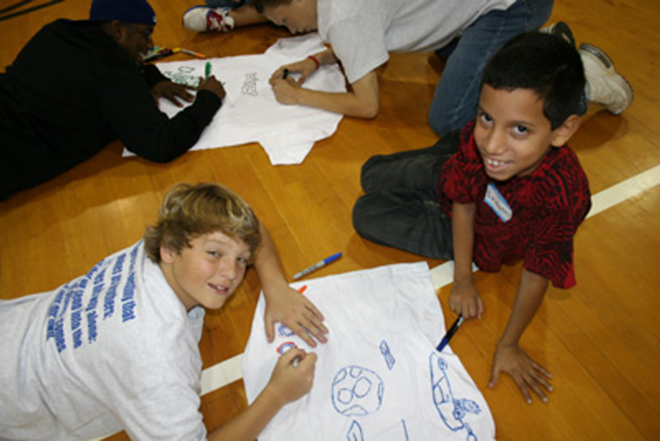
"Which one is my big brother?" a little boy asked on his way into the Stewart Middle School Gymnasium in Old West Tampa a couple of Saturdays ago. He was one of about 20 potential "Littles" on the waiting list for a Big Brother from the Big Brothers Big Sisters of Tampa Bay. But a shortage of male volunteers in the Bay area leaves these boys, many of whom are fatherless, without the influence of a strong male role model.
Jennifer Gandee oversees enrollment of volunteers and children into the region's BBBS program, which provides friends to spend one-on-one time with kids who don't often get much attention from adults. She says that about 350 boys in Hillsborough County are waiting for a big brother; by comparison, there are only about 50 girls awaiting Big Sisters. "The boys can wait up to two years, especially in East Tampa where there's more kids in need."
But the event at Stewart that day wasn't to pair off Bigs and Littles. The BBBS organized a field day so that the boys on the waiting list could spend time with young men in the Boys Initiative, the brotherly version of the Ophelia Project. As the OP gained momentum in empowering girls several years ago, parents started asking, "What about the boys?" Thus, in 2006, the Boys Initiative was born, just as Ophelia was breaking away from the YMCA. The two organizations sit like two well-behaved siblings under the 501(c)(3) umbrella of OPBI, Inc., and share the same office space in West Tampa near the Westshore Mall.
Together, the Littles-in-waiting and about 25 boys in the Boys Initiative leadership program in high schools all over Hillsborough gathered to shoot hoops and play dodgeball, do art projects, have jam sessions and just hang out with each other for the afternoon.
Nicole Hogan's son, Rabeer, 12, of Tampa, had a big brother last year until the Big moved to Maryland to finish college. "That man was so good," she said, listing all the ways James Bianchi, formerly a student at the University of Tampa, helped Rabeer. "My son was so disorganized, disobedient. James took him swimming, skateboarding, gave him a journal. My son can interact now. He can write a letter faster than me now." Rabeer is back on the list to find another Big Brother.
Mom Anahita Tamboli says her son Cyrus and friend EJ McCargar, both freshmen at Robinson High, do everything together. Through her daughters' involvement with the Ophelia Project, Tamboli found out about the Boys Initiative last summer and got her son involved so that he could learn leadership skills and give back to the community. "There are others in this world who don't have anything. It teaches my child diversity; these are our next generation."
"We're temporary replacements," says Cyrus of the younger boys on the BBBS waiting list. In addition to wanting to be a good role model to the kids, he was there to also "have fun and show someone cares, besides their moms."
Heather McConnell, student intervention specialist at Stewart Middle, helped bring the BI to the magnet school for the 2007-2008 year and was sent to Colorado with another faculty member and BI Program Coordinator James Nelson for four days of training last summer to "to learn how the minds of boys work. It was an eye-opening experience that afforded us the tools necessary to address certain issues facing boys growing up in today's society," said McConnell, who last year recognized a need for more support for the males at Stewart.
Open to boys all over Hillsborough County, the Boys Initiative offers school-based curricula in eight-week sessions that help boys develop their full potential instead of trapping them inside masculine stereotypes that demand they be hard, violent or insensitive. Stewart Middle is the first to bring in the BI for an entire school year, adding its Boys on the Rise program to the sixth-grade elective wheel, so that every sixth-grade boy at Stewart has completed the nine-week program in conflict resolution, understanding diversity and communication. In the third and fourth nine-week cycles, currently in effect, 12 boys were selected for a more in-depth program with Mr. Nelson.
Adminstrators at Stewart have noticed a marked change in their male students since instituting the curriculum.
"We have seen a 10 percent decrease in the number of discipline issues comparing sixth-grade boys this year to the sixth-grade boys last year," said McConnell. "I feel that is attributed to not only the Boys on the Rise curriculum but also the teachers of Stewart willing to see a need that must be fulfilled and then rising to the occasion to complete the task."
In their 2000 book, Manifesta: Young Women, Feminism, and the Future, Amy Richards and Jennifer Baumgardner wrote that "men's participation is necessary for full equality." The executive director of the Boys Initiative agrees.
"True social justice does not mean that we switch oppressors," says Mike Trepper, "but rather that we work to ensure that everyone has opportunity and skills to move ahead and to be heard. Our society will function best when everyone is at their best."

